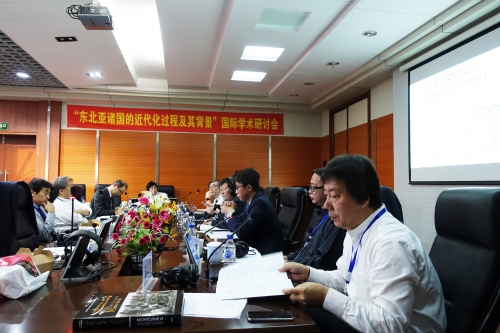No.017 - International Symposium 2017 “Northeast Asia: The Fetal Stage”
International Symposium 2017 “Northeast Asia: The Fetal Stage”
National Institutes for the Humanities (NIHU), Northeast Asia Area Studies Project
Institute for Northeast Asian Research, University of Shimane
Atsushi Inoue, Principal investigator
From September 19-20, 2017, over two days, the Institute for Northeast Asian Research (NEAR Center) at the University of Shimane held its 2nd International Symposium 2017 "Northeast Asia: The Fetal Stage" at the Northeast Normal University in Chanchung, China. At previous year’s 1st International Symposium 2016, “Northeast Asia: The Embryonic Stage” held over two days on November 19-20, 2016, we examined the historical definition of “Northeast Asia” and questions that have existed therein. Based on the outcome of the previous year’s discussions, this year’s symposium focused on understanding aspects of the region’s “fetal stage” and the emergence of ideas on modernistic political systems and nation-states within various nations.
This year’s symposium was made possible through support from the NEAR Center’s partner, the Northeast Normal University, a co-host of this conference, with whom we have had a long and friendly relationship and through assistance from NIHU’s liaison office of the Northeast Asia Area Studies Project that was established in June 2016. We were able to fully experience the importance of NIHU Transdisciplinary Projects in Sino-Japanese academic exchanges.
The symposium’s sessions and presenters were as follows:
SESSION 1: PERCEPTIONS “ORIENTALISM”
S. Chuluun (Professor, Institute of History and Archaeology, Mongolian Academy of Sciences Bayanzurkh Duureg) “Russian Politics over East: Mongolian Questions in the Treaty of Nerchinsk.”
TANG Yanfeng (Lecturer, Northeast Normal University) “The Russian’s View of China from the17th to 18th Century.”
SAWAI Keichi (Professor Emeritus, Keisen University) “The Illusion of Confucianism Co-Prosperity Sphere; ‘Japonisme’ of East Asia in the 18th Century.”
KUROZUMI Makoto (Professor Emeritus, The University of Tokyo) “Japanese ‘Spirituality’ in East Asia from the 18th to the 19th Century.”
SESSION 2: RULING PHILOSOPHIES
SASAKI Shiro (Preparatory Office for National Ainu Museum) “Governing System of the Qing Dynasty in the Amur River Region: Principle and Reality.”
Sodbilig (Professor, Inner Mongolia University) “Transformation of Philosophy to Govern the Frontier of Qing Dynasty: Abstinence to Cultivation.”
HAN Dongyu (Professor, Northeast Normal University) “The Qing Dynasty's ‘Greater Chinese’ Expression toward the ‘Non-Han Chinese Region’: From Awaken to the Grand Justice to the Imperial Edict of Abdication.”
ZHUANG Sheng (Professor, Northeast Normal University) “Geomorphic Features and Relief Policies of Daicing Gurun Ruling Territory: Northeast China’s South Sea and Hunchun River Basin as the Center.”
MAKABE Hitoshi (Professor, Hokkaido University) “Evaluations of the Territory Government by Qing China in Tokugawa Confucian Thought (1644-1850s).”
SESSION 3: “EXCHANGE”
MORINAGA Takako (Professor, Ritsumeikan University) “Tea Trade between Russia and Qing after 1860’s: The Circulation Economic Route Connected by Moscow, Kyakhta and Hankow.”
NAKAMURA Atsushi (Associate Professor, Yamagata University) “Network of the Stations and People Transfer of Mongolia under Qing Dynasty.”
NAMIHIRA Tsuneo (Professor, University of the Ryukyus) “The Ryukyuan People's First Encounters with the Modern West: Focusing on Basil Hall’s ‘Account of a Voyage of Discovery to the West Coast of Corea, and the Great Loo-choo Island, 1818’.”
ISHIDA Toru (Associate Professor, University of Shimane) “About the Handling of Arrivals of Foreign Ships at Tsushima Island in the Edo Period.”
DISCUSSION
HAN Dongyu, LIU Xiaodong, KUROZUMI Makoto, KONAGAYA Yuki (National Institutes for the Humanities), JANG Insung (Seoul National University), HUANG Ko-Wu (Academia Sinica)
Through a total of 13 enlightening presentations and passionate discussions, we clarified the following. On the rise of ideas on modernistic political systems in Northeast Asia, we determined that:
- The transition from the Ming Dynasty to the Qing Dynasty reversed the perception and understanding of Ming-Qing China within Korea and Japan: the notion that Ming-Qing China is no longer a center of culture and civilization, but is barbarous advanced the formation of modernistic nationalism in both countries.
- Active movements of individuals, commodities and capital developed the perception of domestic and foreign territories in various countries in Northeast Asia boosting the self-awareness of a nation.
- The trends mentioned above, that we have defined as the “fetal stage,” transitioned the region from a “era of discovery” to an “era of imperialism.” From a world history perspective, we found concrete examples of emerging ideas on modern political systems in Northeast Asia that brought the region onto the same trajectory as rest of the world that was transforming at the same time.
Thanks to support from the Center of East-Asian Civilizations, Northeast Normal University we were able to hold this two-day international symposium with simultaneous interpretation. This was a very meaningful academic conference and we hope to hold another significant international symposium next year and continue to do so for many years into the future while we deepen our collaborations with overseas research institutions.

Symposium in session
